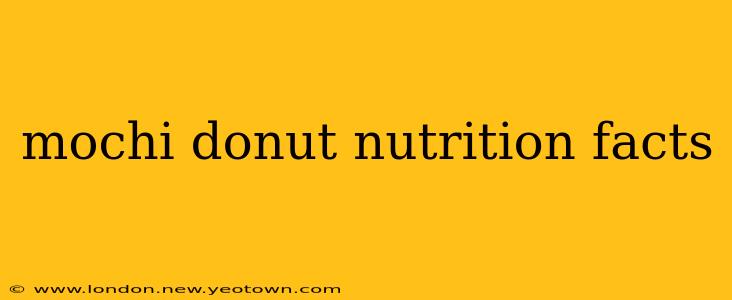The Deliciously Deceptive Delight: Unpacking the Mochi Donut Nutrition Facts
Mochi donuts. Those pillowy, chewy, irresistibly delightful treats have taken the world by storm. But beneath their adorable, often brightly colored exteriors lies a nutritional profile that might surprise you. Let's delve into the fascinating world of mochi donut nutrition, exploring everything from their calorie count to their macro and micronutrient content. We'll even tackle some frequently asked questions to leave you fully informed before indulging in your next delicious bite.
Imagine this: you're strolling through a bustling marketplace, the sweet aroma of freshly baked goods beckoning you closer. Your eyes land on a display of vibrant mochi donuts, glistening with a delicate glaze. One, then two, then maybe three… it's easy to lose yourself in their captivating charm. But how much are you really consuming with each bite?
What are the calories in a mochi donut?
This is a tricky question, because the calorie count of a mochi donut can vary wildly depending on size, ingredients, and glaze. A single, average-sized mochi donut can range from 200 to 350 calories. Those generously glazed, larger donuts will naturally tip the scales towards the higher end of that spectrum. The type of flour used (glutinous rice flour being a key ingredient) also plays a role, as do additions like fillings or toppings.
What are the macros in a mochi donut?
The macronutrient breakdown is equally variable. However, generally, expect a mochi donut to be relatively high in carbohydrates, owing to the rice flour base. The fat content depends largely on the glaze – a rich, creamy glaze will add considerably more fat than a simple dusting of powdered sugar. Protein content tends to be modest. As a rough guideline, expect a ratio similar to this, but always check the specific nutritional information provided by the bakery or manufacturer:
- Carbohydrates: 30-45 grams
- Fat: 10-20 grams
- Protein: 3-7 grams
Are mochi donuts gluten-free?
This is a common question, and the answer is often yes, but not always. Traditional mochi donuts are made with glutinous rice flour, which is naturally gluten-free. However, cross-contamination can occur during production, especially in bakeries that also handle gluten-containing products. Always check the packaging or ask the bakery directly if you have a gluten intolerance or celiac disease. Some mochi donut recipes may also incorporate other flours that contain gluten, so alertness is key.
How do mochi donuts compare to regular donuts nutritionally?
Compared to their traditional counterparts, mochi donuts often have a slightly lower overall calorie count and less fat, particularly if you avoid heavily glazed varieties. However, they're still a treat best enjoyed in moderation. Both types contain similar amounts of carbohydrates.
What are the ingredients in mochi donuts?
The primary ingredients are typically glutinous rice flour, sugar, eggs, and some type of fat (like butter or oil). The specific ingredients and their proportions will, once again, influence the final nutritional value. Always check the ingredient list for potential allergens or additives.
Are mochi donuts healthy?
Let's be honest: mochi donuts are not a health food. They are a delicious treat, best enjoyed occasionally as part of a balanced diet. They're rich in carbohydrates and can be high in sugar and fat, depending on the recipe and toppings.
In conclusion, the nutritional profile of mochi donuts is a complex equation with many variables. While they may offer a slightly healthier alternative to some traditional donuts, they remain a treat that should be consumed mindfully. Always check the specific nutritional information for the brand or bakery you're purchasing from, and remember that moderation is key to enjoying these delectable delights without compromising your overall health.

